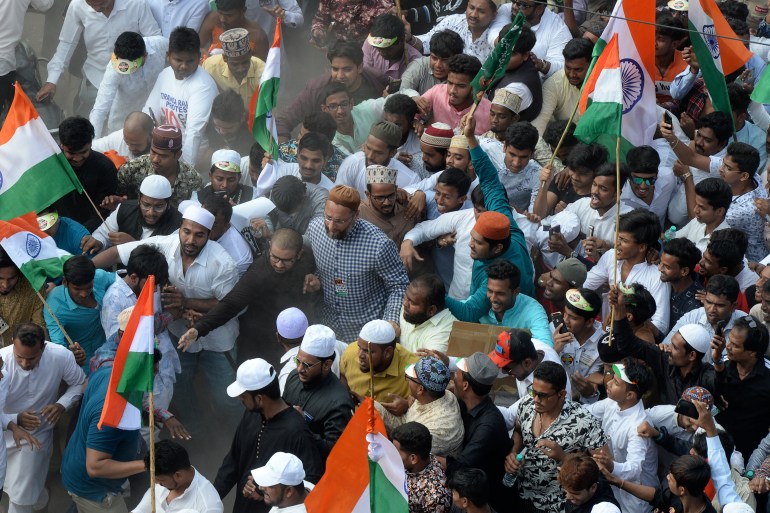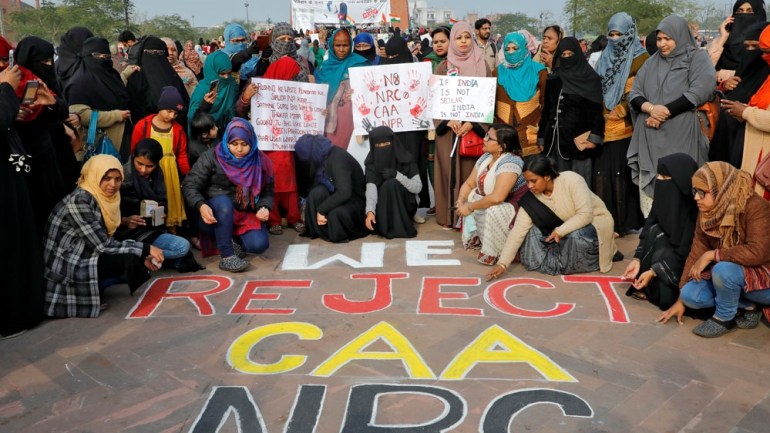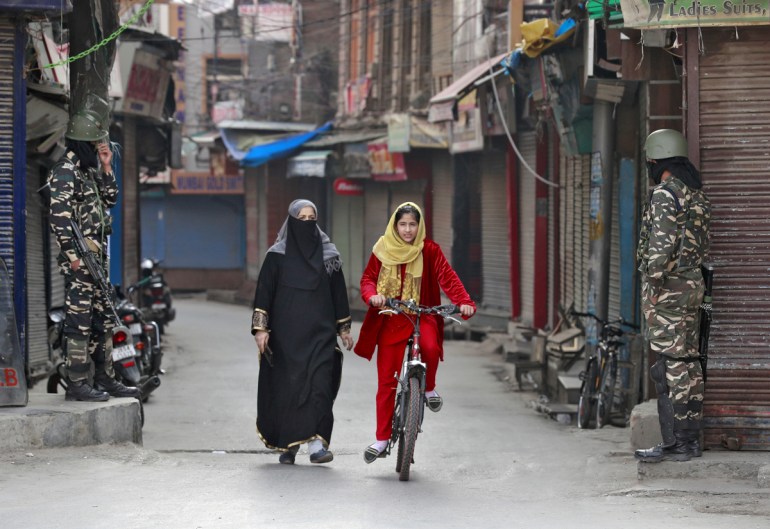In India, a vocal Muslim party expands its base
AIMIM makes a foray into Muslim-majority areas, tapping into Muslim frustrations about opposition parties.

Mudassir Nazar’s family has traditionally voted for opposition parties that espouse secularism but in the recently concluded elections in the eastern Indian state of Bihar they instead cast their ballot for the All India Majlis-e-Ittehad-ul-Muslimeen (AIMIM) party which advocates for the rights of Muslims and other marginalised groups.
“Our village [Bohita] almost unanimously voted for AIMIM,” said Nazar from Muslim-majority Kishanganj district in Seemanchal region of Bihar.
Keep reading
list of 4 itemsWhy Arabs are speaking out against Islamophobia in India
#IStandWithFrance trends in India amid outrage in Muslim world
India Muslims targeted in attacks over coronavirus
AIMIM managed to win five seats from the state which has a substantial Muslim population. Its residents say India’s opposition parties which espouse secularism have ignored the impoverished region for decades, which is wedged between Nepal and Bangladesh.
“There is a sense in the (Muslim) community that secular parties like (Indian National) Congress have betrayed the Muslims,” Nazar told Al Jazeera.
“They (the so-called secular parties) have been reluctant to even talk about the anti-minority decisions of the ruling government, let alone oppose them. AIMIM on the other hand has been pretty vocal and seems to have gained the trust of the community,” he said.
Indian Muslims, who form 14 percent of the country’s 1.3 billion population, have become increasingly marginalised in recent years as they suffer from political underrepresentation. The new Bihar cabinet will have no Muslim minister for the first time in its history.
Currently, out of the 543 members in the lower house of India’s bicameral parliament, only 27 (less than 4 percent) of its members are Muslims – a gain of four seats compared to the 2014 elections, which was the lowest in 40 years.
Hindu nationalist agenda
Since coming to power in 2014, the government of Prime Minister Narendra Modi, as part of its Hindu nationalist agenda, has passed several laws and legislation that critics say discriminate against Muslims.
Last year, a controversial citizenship law, which activists say is not in line with the country’s secular constitution and a proposed citizenship register sparked nationwide protests led mostly by Muslims.

The Modi government also stripped the disputed Kashmir region’s limited freedoms last August and placed the Muslim-majority region under a communication blockade for more than six months.
Opposition parties such as the National Indian Congress party, for whom Muslims have traditionally voted for, have been accused of being silent on key issues which threaten the Muslim community – India’s largest minority group.
For decades, AIMIM was confined to the southern city of Hyderabad in Telangana state but in recent years it has managed to venture into Muslim-majority areas, tapping into Muslim frustration about political disenfranchisement.
The party is led by Asaduddin Owaisi, a four-time member of parliament known for his feisty debates in parliament as well as on TV. Owaisi has emerged as a vocal conduit for Muslim issues in the country.
AIMIM has accused India’s opposition parties of failing to speak out against Modi’s Hindu nationalist agenda.
“These (secular) parties out of various electoral compulsions have not come forward openly to protest against the decisions of the (BJP) government that go against fundamental values of the (Indian) constitution. That has led some sections of Muslims to turn to AIMIM, as they see it as a counter-force,” Avinash Kumar, an assistant professor in political studies at Jawaharlal Nehru University (JNU), New Delhi, told Al Jazeera.
“When every so-called secular party is competing to prove itself as a torchbearer of majoritarianism, while ignoring the condition of marginalised communities, it is a very natural process to see the rise of a party with [a] focus on the plight of a particular community.”
A nationwide appeal
During state election campaigning in Bihar, the Congress party and its regional ally the Rashtriya Janata Dal (RJD) avoided raising issues that were pertinent to Muslims.
“These parties campaigned on issues like employment and development only, because by raking up minority discrimination issues, they didn’t want to let go of the majority votes,” Majid Alam, a journalist based in Bihar, told Al Jazeera.

“So a section of Muslim voters decided it was time to fully rally behind a party (AIMIM) that was vocal about their issues.”
Some analysts say that AIMIM will emerge as the first Muslim political group in the country’s post-independence history with a nationwide appeal, though an overwhelming majority of Muslims still vote for opposition parties.
“We have raised issues of injustices meted out to all minorities including Muslims and people acknowledge that. It has now started to reflect in our electoral performances,” Waris Pathan, National Spokesperson of AIMIM, told Al Jazeera.
The party polled more than 500,000 votes in the recent elections versus the 2015 state elections when it had barely managed 80,000 votes and did not win a single seat.
“Bihar is not an aberration. We have improved our numbers wherever we are contesting. In Maharashtra (elections) last year we increased our vote share substantially and also managed a couple of seats,” Pathan said.
However, the senior leader and national spokesperson of AIMIM, Syed Asim Waqar believes the party is a viable alternative not only for Muslims but for the country as a whole.
“We never represent ourselves as a Muslim party, Waqar told Al Jazeera. “We have managed to win seats even in areas where Hindu population is in majority and Muslim percentage is very less. It is possible only because Hindus particularly Dalits are also voting for us.”
In the Bihar state elections, the party joined with the Bahujan Samaj Party (BSP) and Rashtriya Lok Samta Party (RLSP), which represent various marginalised castes other than Muslims.
Muslim-Dalit alliance
AIMIM formed an alliance with a Dalit party in Maharashtra in the 2019 general elections and won a parliamentary seat outside its bastion in Hyderabad for the first time.
Political analysts say AIMIM’s rise has been possible largely because of the charisma of Owaisi, who has captured the imagination of India’s young Muslim voters.

“His appearance, style and language are no match to any of his contemporaries and that has been a huge factor in the rise of AIMIM, ” said Mohammad Reyaz, an assistant professor of journalism at Aliah University in the eastern city of Kolkata.
Dressed in a Sherwani, a traditional long tunic worn by South Asian Muslims – and sporting a skull cap, the 51-year-old leader of AIMIM can often be seen fiercely debating his opponents on prime time TV news.
“He (Owaisi) also speaks well in the parliament; with a lot of authority and after thorough research. That has also captured the minds of Muslim voters and obviously, it is now getting reflected in his electoral numbers,” Kumar from JNU said.
But some opposition parties in the country accuse AIMIM of dividing the Muslim vote, thereby helping the BJP.
“While the Bharatiya Janata Party is polarising the people of the country on religious lines, AIMIM is also doing the same. It (AIMIM) never achieves anything substantial electorally but only divides Muslim votes which helps BJP and its allies to come to power,” Meem Afzal, the national spokesperson of the Indian National Congress party told Al Jazeera.
Unfazed by criticism, the party is now eying the upcoming elections in West Bengal state where Muslims form 27 percent of the population.
“The aim definitely is to establish a pan-India presence,” Adil Hasan Azad, AIMIM Youth President of Bihar, told Al Jazeera.
